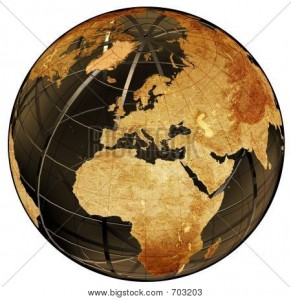The next destination, part I
There is a common trait among us travelers regarding the seasons: With the onset of spring, thoughts turn to traveling. It’s in our DNA. This can pose a conundrum for us, since another trait of the inveterate traveler is difficulty with deciding where to go next with limited resources (and they are always limited).This can provoke a lot of angst and indecision for us. For the next few posts, I’ll be examining the different ways travelers approach the big decision of the Next Destination in hopes that it will help some globe trotters who are hung up on the issue.
Things to think about are finite things such as time and money. Where is affordable? How far can my dollars stretch? Can I spend enough time there to really get a feel for the place, and still eat decently and sleep in a clean place? What’s the exchange rate? Dollars to pesos or pounds (Greece is a good deal these days)? Is a bed and meal cheap where you’re going? Are there budget options like hostels and humble, family-run B&B’s? As Americans, we’re the most time-poor people in the industrialized world, so will you be able to beg, steal, and borrow enough time to really get a feel for your destination?
If time is less of an issue than money (i.e. you’re an unemployed travel writer like myself) there are ways to get overseas and immersed in a culture while earning income, such as work-stays can be a good option; doing seasonal agricultural work on a family farm in exchange for room and board can lead to deep, rewarding cultural immersion (and a nice tan). If less labor-intensive jobs are to your liking, summer gigs at a resort or even a hostel can help pay the bills.
In the next post I’ll discuss some things you can do to help yourself pare your list down to a manageable level and really start planning an adventure to remember.



March 29th, 2013 at 8:28 am
The time to start planning your next trip is not spring, but late autumn, soon after you have cleared up the details of your last trip. You will want to research the history and customs of the place, to find and read the classic travel accounts, to work on what language you may need, to arrange local contacts, . . .. Good Lord, man, surely you don’t intend to just parachute in.
March 29th, 2013 at 10:46 pm
Ideally yes, that is absolutely right. And I do that. But it all depends on when you find out how much time you can take, etc. For some, that can only be done once spring arrives.
February 1st, 2014 at 1:31 am
Useful questions I think, but a worthwhile one not included is ‘what effect will I have on the place after I’m gone…?’ ‘What is the legacy?’
Travel need not be about trying to cut costs all the time… It is possible to use time in ways that mean you make a positive difference while being culturally immersed (ie, the goal is to use our ‘limited resources’ as material;y well off westerners in ways that are not neutral or negative with respect to the places being travelled to, ass often not so materially well off…. But to do this requires perhaps spending more for ‘less’ (ie you get relatively shorter time travelling perhaps – but you can have experience in local areas while making sure your money goes to a worthwhile cause… Ie, – instead of cutting costs and extending travel, you spend more and provide income for local based groups… The money goes and stays in communities, rather than going to head office or not really going anywhere at all (because despite currency being favourable you’re penny pitching, haggling, and spending little…
I came across an organisation doing this sort of thing recently when travelling in Sri Lanka – it’s called ‘Solidestinations’ and can be found on facebook and via a search. How it works is you get a package for a homestay and tours etc and the money will be directed towards funding local infrastructure, social projects… It is ‘sustainable tourism’ where the questions one asks before going aren’t just about ourselves…
Seeking out these newer, alternative forms of tourism, travelling could help to avoid doing something that hurts people… This is shown in a short video made by a group i’m involved with – ‘Learning Service’ – highlighting the perils of ‘orphanage tourism’ – https://learningservice.info/videocontest/portfolio/video-4-2/. There are other videos on the site and facebook page if you’re interested and want to talk more, or get involved. More conversation about these things the better I say… Cheers ?